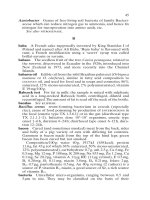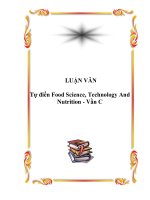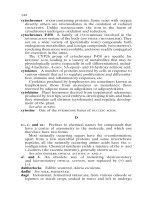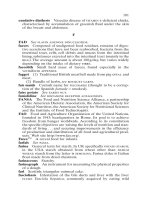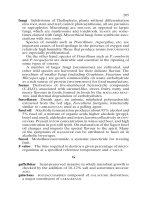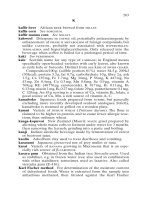Department of Food Science & Technology Undergraduate Programs pdf
Bạn đang xem bản rút gọn của tài liệu. Xem và tải ngay bản đầy đủ của tài liệu tại đây (1.14 MB, 20 trang )
INSIDE
• Undergraduate Program
Information
Food Science
Food Business
Management
Food Science & Nutrition
Food Processing (Minor)
Food Safety (Minor)
• Course Descriptions
• Career Opportunities
• Scholarship Information
fst.osu.edu
FOOD SCIENCE AND TECHNOLOGY
Department of Food Science
& Technology
Undergraduate Programs
College of Food, Agricultural and Environmental Sciences
2
Have you ever wondered why the ingredients of plain M&Ms include a “trace amount of
peanuts” (or how they get that "m" on there)? Or why hamburgers should be eaten well done, but
steaks are perfectly safe rare? Or why dough doesn’t turn brown if you cook it in a microwave? Or just
how good oat bran is for you? The majors offered by the Department of Food Science and Technology
answer all these questions and more.
Food Science and Technology is a multi-disciplinary field that applies fundamental scientific principles
to the research, development, manufacture, packaging, storage, and marketing of food products. It is
a discipline in which biology, chemistry, engineering, microbiology, biochemistry, toxicology,
management, and other basic and applied sciences are used to study the nature of foods, the causes
of their deterioration, and the principles underlying food processing.
The comprehensive programs offered in the department allows for every aspect of the food industry to
be studied; students can choose to focus on either food science, nutrition or food business
management. Also offered are two new minors: Food Safety and Food Processing.
Food Science
Our nationally approved curriculum produces graduates who are well prepared to work in the public or
private sector. Many continue studies towards a master’s or doctorate degree. They learn the
chemistry, microbiology, structure, engineering, safety and nutrition of food as it is processed,
packaged, distributed, stored and used.
Nutrition
Majors learn nutrient use by humans and higher animals. Whereas food science is the study of what
people do to food, nutrition is concerned with what food does to people. A new emphasis is the role of
diet in prevention or treatment of chronic illnesses. Many graduates in nutrition are well prepared to
enter graduate fields including medical school.
Food Business Management
There is a high demand for people with skill in food science and knowledge of business, accounting
and personnel management. The Food Business Management curriculum prepares you for managerial
positions. The advance of many food science graduates into business-oriented employment creates the
demand for the new business major.
All of our graduates have jobs in the field within six months of graduation, and we have frequent
requests from employers for more graduates. The median starting salary for a graduate with a B.S. in
food science is $45,000. The demand for graduates continues to grow at a rate that exceeds
enrollment.
3
Food Science and Technology
EMPLOYERS OF OUR FST GRADUATES
T
YPICAL CAREERS
OUR GRADUATES NOW HOLD THESE TITLES:
Associate Scientist Plant Manager
Brewmaster President
Chairman of the Board Product Development Scientist
Communications & Marketing Director Production Manager
Consultant Professor
Director of Research and Development Quality Control Supervisor
Director, Quality Assurance and Regulatory Affairs Regional Agro-Industries Officer
Director of Food Microbiology and Safety Research Leader
Director of Logistics and Process Control Senior Vice President for Research
Executive Director Senior Scientist
Food Technologist Senior Food Process Engineer
Graduate Research Associate System Coordinator
Manager, Technical Sales and Business Development Technical Director
Manager, Industrial Product Development Unit Leader
Marketing Manager Specialty Products Development Vice President & General Manager
M.D. (Medical Doctor) Vice President, Research Division
Physician Veterinarian
MEDIAN STARTING SALARY FOR BS IN FOOD SCIENCE REACHES $45,000
FOOD TECHNOLOGY, V.5E(3) 47-52.
Anheuser-Busch Gerber M & M Mars Candy Ralston Purina
Baskin-Robbins Heinz Nabisco Reiter Dairy
Bob Evans Hershey Foods Nestle Ross Laboratories
Campbell’s Soup Hormel Pepsi Sara Lee
Carnation Kellogg’s Pierre Frozen Foods Schreiber Cheese
Coca Cola Kraft Foods Pillsbury Smith Dairy
Frito Lay Kroger Procter and Gamble Smucker's
General Mills Land O’Lakes Quaker Oats Stouffer Foods
4
The Ohio State University
FOOD SCIENCE UNDERGRADUATE COURSES
170 Wine in Western Culture U 3
The role of wine in western culture with emphasis
on the geographic origins, production techniques,
and stylistic considerations.
201 The Science of Food U 5
Food and nutrition in modern civilization;
principles involved in assembling, processing, and
distribution of food; and the role of science,
industry and government in meeting food needs.
H208 Food: Fact and Fiction U 5
Introduction to controversial topics in food
science and nutrition that are found in popular
media.
210 Dairy Products Evaluation U 2
Major commercial dairy products are evaluated
following the rules of the National Dairy Products
Evaluation Contest.
401 Introduction to Food Processing U 3
Unit operations in food processing, basic elements
of food processing equipment, product
formulation, food manufacturing, quality control,
cleaning and sanitizing.
410 HACCP Analysis U 3
Principles of hazard analysis as applied to the
food industry. Students will develop a HACCP food
safety plan.
541 Physical Properties of Foods U G 4
Elements of identification and measurement of
physical properties of foods and application to
food systems.
589 Professional Experience U 5
Ten weeks of supervised, structured, in-depth
industrial experience in selected food related
subjects.
597.01 Alcohol and Society U 5
The historical, nutritional, medical, social,
technical and economic aspects of the use of
alcohol.
601 Food Analysis U G 5
Basic composition, chemical structures and
properties of foods; chemical and instrumental
analyses of food components.
605 Advanced Food Chemistry U G 4
Intensive coverage of the chemical reactions of
food components with emphasis on the reaction
mechanisms responsible for changes in food
products.
610 Processing of Fluid Milk and Related
Products U G 4
Principles involved in the production, processing
and marketing of high quality, safe and nutritious
milk and milk products.
611 Cheese and Fermented Foods U G 4
Principles and practices related to the
manufacture, processing, distribution, marketing,
nutritional value and safety of fermented foods.
613 Fruit and Vegetable Processing U G 4
Commercial processing of fruits, vegetables and
related products. The effect of processing and
raw product chemistry on final product quality.
5
621 Food Additives U G 3
Chemical and physical nature of food additives;
functions and effects on chemical, rheological,
microbiological, and nutritional properties of
foods.
630 Principles of Food Processing U G 4
Principles of science and engineering applied in
food processing; concentration, separation and
thermal sterilization processes.
632 Sensory Evaluation U G 4
Fundamentals of sensory evaluation and the per-
ception of taste, smell, and flavor. Emphasis on
statistical interpretation and industrial applica-
tion.
636.01 Food Microbiology Lecture U G 3
Microorganisms in relation to the production,
processing and handling of food with emphasis on
food transmitted pathogens and minimizing public
health risks.
636.02 Food Microbiology Lab U G 3
Laboratory training for determining the microbi-
ological safety and quality of food with emphasis
on handling pathogens and observing analyst's
safety.
640 Food Regulations U G 3
Food laws, regulations, grade standards, and the
technical control of processed foods; interpreta-
tion of laboratory analysis for control of product
quality.
648 Essentials of Food Plant Operation U G 3
An in-depth presentation of the special factors
affecting food plant organization, production,
procurement, distribution, and the interaction
required to develop plant operations.
649 Food Packaging U G 4
A discussion of terminology and literature of com-
mercial packaging and principles of selecting
packaging material.
650 Food Product Development U G 4
Development of new food products including gen-
eration of concepts, consumer panel testing, de-
velopment of prototypes, process optimization
and consumer testing.
H683 Honors Projects U 1-10
Conducting and reporting the honors project.
692 Workshop in Milk and Food Sanitation U 1-2
Five day in-depth program on fundamentals of milk
and food protection; designed for individuals inter-
ested in food processing, distribution; quality con-
trol, public health and regulatory activities.
693 Individual Studies U G 3-5
Individual project studies of current problems; plan-
ning, conducting and reporting.
696 Technical Problem Solving U G 5
Analysis of technical problems in food science;
fostering creative thinking to the approach and
solution of problems; preparation and oral pres-
entation of papers.
Food Science and Technology
6
The Ohio State University
MEET OUR DISTINGUISHED FACULTY
The Department of Food Science and Technology has an outstanding, nationally recognized faculty
that includes two endowed research chairs. Most of our faculty members are nationally or
internationally known experts, journal editors, scholars and award winners. Our emphasis on
outstanding teaching earned the department the University’s Teaching Excellence Award. Food
Science faculty members have won 34 distinguished teaching and advising awards, including two
Cruess Teaching Excellence Awards from the Institute of Food Technologists.
Valente Alvarez Professor & Interim Director Food Industries Center (Ph.D., Michigan State
University) Advancement of Ohio's dairy industry, quality and shelf life of milk, processing of milk
using pulsed electric field technology and whey processing; coaches the Dairy Products Evaluation
Team.
Bala Balasubramaniam Associate Professor (Ph.D., The Ohio State University) Food safety
engineering, emphasis on high pressure processing and other advanced food technologies.
Sheryl Barringer Professor (Ph.D., University of Minnesota) Coatings: electrostatic,
nonelectrostatic, liquid and powder. Fruit and vegetable processing, especially tomatoes. Dielectric
properties.
Jeff Culbertson Professor (Ph.D., Washington State University) Fat substitutes, food proteins.
Jeannine Delwiche Associate Professor (Ph.D., Cornell University) Sensory science (how humans
experience taste, smell and flavor), including food industry outreach, sensory science instruction and
taste perception research.
Monica Giusti Assistant Professor (Ph.D., Oregon State
University) Research interests are functional foods,
phytochemicals. The study of non-volatile compounds in fruits
and vegetables with potential health promoting properties.
James Harper J.T. “Stubby” Parker Endowed Chair in Dairy
Foods (Ph.D., University of Wisconsin) Honorary Research
Fellow, New Zealand Dairy Research Institute; Consultant.
Internationally recognized for establishing new directions in
dairy research.
Lynn Knipe Associate Professor (Ph.D., Iowa State University) Primary responsibilities include
processed meat extension activities for the Ohio meat industry. He is involved in research and
teaching and serves a joint appointment with the Department of Animal Sciences.
7
Ken Lee Professor (Ph.D., University of Massachusetts, Amherst) Mineral nutrient interactions in
processed foods. Editorial board of the CRC Critical Reviews in Food Science and Nutrition. Invited
speaker on food safety.
Michael Mangino Professor Emeritus (Ph.D., Michigan State University) Dr. Mangino’s primary
research interest is the relationship between protein structure and function in food products.
Recipient of the IFT Cruess Award for Teaching Excellence and the University’s Distinguished
Teaching Award.
David Min Professor (Ph.D., Rutgers University) A flavor chemist using highly sophisticated lab
instrumentation. Editorial Board of Critical Reviews in Food Science and Nutrition and Food
Chemistry (England). Associate Editor of the JAOCS. IFT Steven S. Chang Award, 1995.
Melvin Pascall Assistant Professor (Ph.D., Michigan State University) Food
packaging engineering, aseptic processing and packaging; food safety; modified
atmosphere packaging.
Luis Rodriguez-Saona Assistant Professor (Ph.D., Oregon State University)
Analytical protocols related to nutrition and food safety; advanced detection
methods.
Steven Schwartz Professor and Endowed Haas Chair in the Food Industries
(Ph.D., University of Wisconsin at Madison) Teaching expertise in food toxicology,
food chemistry and aseptic processing and packaging. Heads a nationally
renowned research program studying carotenoids and antioxidants in foods.
Denise Smith, Professor and Department Chair (Ph.D., Washington State University) Food
chemistry; chemistry and functionality of meat and dairy proteins, meat and poultry quality and
safety.
Stephanie Smith Lecturer (Ph.D., Michigan State University) Interests are food safety and nutrition
public policy.
Yael Vodovotz Associate Professor (Ph.D., University of Massachusetts) Carbohydrate chemistry with
emphasis in the area of water mobility and stability in starch-based products and development of
baked goods with extended shelf life.
Hua Wang Assistant Professor (Ph.D., University of Minnesota) Molecular mechanism of stress
responses and its application in food safety microbiology; bioengineering microorganisms for
industrial applications; rapid methods development.
Ahmed Yousef Professor (Ph.D., University of Wisconsin-Madison) Investigating new measures to
control pathogenic bacteria in food. Courses taught include Food Microbiology.
Food Science and Technology
8
REQUIRED: 14-15 HOURS
FST 401 Intro to Food Processing 3
FST 648 Food Plant Operations 3
Microbiology 509 or 520 5
S
ELECT ONE COURSE (3-4 HOURS)
FST 610 Dairy Processing
FST 611 Cheese & Fermented Foods
FST 613 Fruit & Vegetable Processing
FST 630 Principles of Food Processing
Anim Sci 555.02 Meat Processing
FABE 481 Introduction to Food Process Engineering
Electives: Select 5-6 hours from the following classes
(required and elective courses in the minor must total 20 credit hours)
FST 410 HAACP 3
FST 610 Dairy Processing 4
FST 611 Cheese & Fermented Foods 4
FST 613 Fruit & Vegetable Processing 4
FST 621 Food Additives 3
FST 630 Principles of Food Processing 3
FST 636.01 Food Microbiology Lecture 3
FST 649 Food Packaging 3
Anim Sci 555.02 Meat Processing 4
FABE 481 Introduction to Food Process Engineering 3
New! FST Minors!
In addition to granting Bachelor’s degrees, the Department of Food Science &
Technology also offers two minors: Food Processing and Food Safety.
FOOD PROCESSING MINOR
A minor in food processing is for students who wish to develop a better understanding
of the fundamental principles of food processing for value addition, with a focus on
plant operations.
The Ohio State University
9
FST MINORS (CONT’D)
FOOD SAFETY MINOR
A minor in food safety is for students interested in the principles underlying keeping food safe and will
be especially helpful for those students interested in working in this aspect of the food industry.
Topics covered focus upon microbiology and safety of food as it is
manufactured and distributed.
The minor in Food Safety consists of 20 hours including 14 hours of required courses. If
Microbiology 509 or 520 is taken for major or GEC, then 5 additional elective credits must be taken.
R
EQUIRED: 14 HOURS
FST 410 HAACP 3
FST 636.01 Food Microbiology Lecture 3
FST 636.02 Food Microbiology Laboratory 3
One from: 5
Microbiology 509 Basic and Practical Microbiology
Microbiology 520 General Microbiology I
Electives: Select a minimum of 6 hours from the following classes
(required and elective courses in the minor must total 20 credit hours)
FST 401 Introduction to Food Processing 3
FST 610 Dairy Processing 4
FST 611 Cheese & Fermented Foods 4
FST 613 Fruit & Vegetable Processing 4
FST 630 Principles of Food Processing 3
FST 648 Food Plant Operations 3
Anim Sci 555.02 Meat Processing 4
Restrictions and General Information
1. These minors are not available to students majoring in Food Science or Food Business
Management.
2. A minimum overall CPHR for courses comprising the minor shall be 2.0.
3. A minor should be declared at the time a student accumulates 90 hours.
4. A maximum of five credit hours may overlap between the minor and the GEC
(foundations, natural sciences, arts and humanities and social sciences).
5. Courses taken on a pass/non pass basis may not be applied to the minor.
Food Science and Technology
10
FOUNDATIONS (25-26 HOURS)
CFAES 100 or UVC 100 1
English 110 C 5
2nd Writing Course (367) from list (may be used for other GEC requirement) 5
Oral Communication - Agr Com 390 or Com 321 4-5
Math 150, 151 10
N
ATURAL SCIENCE (41 HOURS)
Biology 113 5
Chemistry 121, 122, 123, 251, 252 16
Physics 111, 112 10
Biochemistry 511 5
Microbiology 509 5
International Issues - Fulfill with selected Social Science or Arts & Humanities
Non-Western or Global course (* on curriculum sheet) -
Non-Western* or Western, non-US course (♦ on curriculum sheet) -
S
OCIAL SCIENCE (15 HOURS)
Agr Econ 200 or Econ 200 5
Rural Soc 105 or Soc 101 5
One course from social science list+ 5
A
RTS AND HUMANITIES (20 HOURS)
One course in History from approved list+ 5
One Literature course from approved list+ 5
One Visual & Performing Arts from list+ 5
One additional Arts & Humanities or History from list + 5
+Certain courses fulfill International Issues requirement
O
THER REQUIREMENTS (10 HOURS)
Contemporary Issues (597) - selected from approved list 5
Internship - FST 589 5
M
AJOR (55-65)
Data Analysis from approved list
5
HNFM 310 The Science of Food - Human Nutrition
5
Ag Eng 481 Introduction to Food Process Engineering
4
FST 401 Introduction to Food Processing
3
FST 601 Food Analysis
5
FST 605 Advanced Food Chemistry
4
FST 621 Food Additives
3
FST 630 Principles of Food Processing
4
FST 632 Sensory Evaluation
4
FST 636.01, 636.02 Food Microbiology Lecture & Lab
6
FST 696 Technical Problem Solving
5
R
EQUIRED (48 HOURS)
The Ohio State University
B.S. IN FOOD SCIENCE MAJOR REQUIREMENTS
11
FST ELECTIVES (SELECT 7-14 CREDIT HOURS FROM LIST)
FST 541 Physical Properties of Food 4
FST 610 Processing of Fluid Milk and Related Products 4
FST 611 Cheese and Fermented Foods 4
FST 613 Fruit and Vegetable Processing 4
FST 640 Food Regulations 3
FST 648 Essentials of Food Plant Operation 3
FST 649 Food Packaging 4
FST 650 Food Product Development 4
An Sci 555.02 Meat Processing 4
MINIMUM FOR THE DEGREE 190
FOOD SCIENCE REQUIREMENTS (CONT’D)
Food Science and Technology
12
MAJOR (55-65)
R
EQUIRED COURSES
Acct & MIS 211 Intro to Accounting, if not taken in minor 5
Acct & MIS 212 Intro Acct or AED Econ 412 Farm Records & Analysis, if not taken in
minor
5
Data Analysis ( from Approved list) 5
ANIMAL SC 355.01 Principles of Meat Science 3
FST 201 The Science of Food 5
FST 401 Introduction to Food Processing 3
FST 410 HACCP Analysis 3
FST 640 Food Regulations 3
FST 648 Essentials of Food Plant Operation 3
FST 696 Technical Problem Solving 5
CFAES 100 or UVC 100 1
English 110 C 5
2nd Writing Course (367) from list (may be used for other GEC requirement) 0-5
Oral Communication - Agr Com 390 or Comm 321 4-5
Math 130 or 148 5
N
ATURAL SCIENCE
Biology 101 or 113 or H115 5
Chemistry 101 and 102 or 121 and 122 10
Physics 103 or 111 or 131 or 161 5
Microbiology 509 5
I
NTERNATIONAL ISSUES - FULFILL WITH SELECTED SOCIAL SCIENCE OR ARTS & HUMANITIES
Non-Western or Global course (* on curriculum sheet) -
Non-Western* or Western, non-US course (♦ on curriculum sheet) -
S
OCIAL SCIENCE (15 HOURS)
Agr Econ 200 or Econ 200 5
Rural Soc 105 or Soc 101 5
One course from social science list + 5
A
RTS AND HUMANITIES (20 HOURS)
One course in History from approved list + 5
One Literature course from approved list + 5
One Visual & Performing Arts from list + 5
One additional Arts & Humanities or History from list + 5
+Certain courses fulfill International Issues requirement
O
THER REQUIREMENTS
Contemporary Issues (597) - selected from approved list 5
Internship - FST 589 5
F
OUNDATIONS
The Ohio State University
B.S. IN AGRICULTURE, FOOD BUSINESS MANAGEMENT MAJOR REQUIREMENTS
13
FOOD PROCESSING SELECT 7 - 8 HOURS FROM:
FST 610 Processing of Fluid Milk and Related Products
4
FST 611 Cheese and Fermented Foods
4
FST 613 Fruit and Vegetable Processing
4
ANIMAL SC 555.02 Meat Processing
4
RESTRICTED ELECTIVES SELECT 7 - 26 HOURS FROM:
AED ECON 403 Principles of Agribusiness Finance 4
AED ECON 411 Strategic Planning for the Farm Business 3
AED ECON 421 Salesmanship in Agriculture 3
AED ECON 422 Economics of the Livestock-Meat Industry 3
AED ECON 423 Grain Marketing 3
AED ECON 426 Dairy Marketing and Pricing 3
AED ECON 428 Marketing Fruits and Vegetables 3
AED ECON 441 Agricultural Cooperatives 3
AED ECON 460 Human Resource Management in Small Businesses 3
AED ECON 534 Food and Fiber Economics 3
AED ECON 553 Economic Analysis of Consumption, Food and Nutrition 4
AED ECON 620 Agri-Industry Organization and Public Policy 4
BUS-FIN 510 Legal Environment of Business 4
ANIMAL SC 555.02 Meat Processing 4
BUS-ADM 555 Introduction to International Business 4
BUS-M & L 650 Marketing 4
BUS-MHR 660 Introduction to Human Resource Management 4
ECON 201 Principles of Macroeconomics 5
FST 610 Processing of Fluid Milk and Related Products 4
FST 611 Cheese and Fermented Foods 4
FST 613 Fruit and Vegetable Processing 4
FST 621 Food Additives 3
FST 632 Sensory Evaluation 4
M
INOR: - - THESE COURSES CANNOT FULFILL ANY OTHER REQUIREMENTS - (20-25)
M
INIMUM FOR THE DEGREE 190
FOOD BUSINESS MANAGEMENT REQUIREMENTS (CONT’D)
Food Science and Technology
14
FOUNDATIONS (25-26 HOURS)
FAES 100 or HEC 100 or UVC 100 1
English 110C 01 5
2nd Writing Course (367) from list (may be used for other GEC requirement) 5
Oral Communication - Agr Com 390 or Comm 321 4-5
Math 150 (Most medical schools require Math 151 as well) 5
N
ATURAL SCIENCE (20 HOURS)
Biology 113, 114 or H115, H116 10
Physics 111, 112 or 131, 132 (Most med schools also require Physics 113 or 133) 10
I
NTERNATIONAL ISSUES - FULFILL WITH SELECTED SOCIAL SCIENCE OR ARTS & HUMANITIES
Non-Western or Global course (* on curriculum sheet) -
Non-Western* or Western, non-US course (♦ on curriculum sheet) -
S
OCIAL SCIENCE (15 HOURS)
Agr Econ 200 or Econ 200 5
Rural Soc 105 or Soc 101 5
One course from social science list - certain courses fulfill International Issues 5
A
RTS AND HUMANITIES (20 HOURS)
One course in History from approved list+ 5
One Literature course from approved list+ 5
One Visual & Performing Arts from list 5
One additional Arts & Humanities or History from list+ 5
Contemporary Issues (597) - selected from approved list 5
Internship - Humn Nutr/FST 589 or An Sci 489 3-5
Choose two of the following to fulfill 3rd writing requirement:
Hum Nutr 610, An Sci 630.01, 630.02, Human Nutr/An Sci/Food Sci 761, 762
O
THER REQUIREMENTS (8 -10 HOURS)
+Certain courses fulfill International Issues requirement
The Ohio State University
B.S. IN NUTRITION MAJOR REQUIREMENTS
15
SUPPORTING REQUIREMENTS (48-59 HOURS)
Chemistry 121, 122, 123 or H201, H202, H203 15
Chemistry 251, 252 6
Chemistry 211 or 221 (recommended) or Biochemistry 521 or Mol Gen 601 or 602 0-5
Chemistry 245 or 254 (Most medical schools require Chem 221, 253, 254, and 255) 2-3
Biochemistry 511 5
Molecular Genetics 500 (recommended for pre-medicine) or Animal Sciences 320 5
Microbiology 509 (recommended) or 520 & 521 5-10
EEOB 232 (recommended) or An Sci 310 (Most medical schools also require EEOB 410 and 512) 5
Data analysis (Chem 221 recommended) 5
M
AJOR (25-28 HOURS)
Human Nutrition 310 or Anim Sci 330 5
Hum Nutr 610 or An Sci 630.01 or 630.02* (630.01/.02 can also fulfill 3rd writing
requirement)
5
Select one of 3 options in Advanced nutrition: 10
(1) Food Science 761 and 762 or 763 (761/762 can also fulfill 3rd writing
requirement)
-
(2) Human Nutrition 612.02, 612.01 and Med Diet 546 -
(3) Med Diet 520, 521 and 546 -
Select from Human Nutrition 295, 313, 314, 415, 450, 504, 506, 593, 704, 705;
Human Nutrition/Animal Sciences/Food Science 761, 762, 763
5-6
M
INIMUM FOR THE DEGREE 191
R
ECOMMENDATIONS FOR STUDENTS PURSUING MEDICAL CAREERS:
Take Chem 221, 253, 254, 255, Physics 113, Math 151, Mol Gen 500, and EEOB 410,
512
R
ECOMMENDATIONS FOR STUDENTS PURSUING GRADUATE STUDIES IN NUTRITION:
Take one of the following: Chem 211, 222; Biochem 521; Mol Gen 601, 602
NUTRITION MAJOR REQUIREMENTS (CONT’D)
Food Science and Technology
16
The Ohio State University
ALUMNI PROFILES
Food Science graduates enjoy a wide variety of interesting and rewarding careers. Here’s what some
of our alumni have to say about the opportunities afforded them by a bachelor’s degree in food
science.
Scott Cramer, B.S. Food Science
Director of Technical Sales, Total Ultimate Foods
In my current position, I am responsible for generating new national, multi-chain unit and industrial
accounts, and I provide technical support for our regional sales staff. OSU gave me the background I
need in order to fully understand the products we sell—I can answer any technical questions the
customer may have about our products on the spot.
I couldn’t have asked for a better educational experience. All the professors are approachable and
helpful. There are so many options once you graduate from OSU with a food science degree. You can
get into research and development, quality assurance, sales, production, or continue on and earn your
masters or doctorate. There are a ton of fields to get into, whether you enjoy confections, dairy,
beverages, fruits, meats, powders, snack foods, etc.
Jori Leszczynski, DVM, B.S. Food Science
Assistant Director of the Biological Resources Unit, Cleveland Clinic Foundation
In addition to being the veterinarian for all of the animals housed at the clinic, I also manage the
surgical area, the chronic care unit and the veterinary technicians. I consult with the researchers on
the best models to use for their research and sit on the committee that reviews and approves the
protocols for animal care and use.
I was interested in a major that could provide me with the requirements to attend veterinary school
that also incorporated a scientific background. Food science provided me with a major that brought
together my interest in science (chemistry and nutrition) with a major that provided an excellent
career path if I chose not to pursue veterinary medicine.
Carrie Kincaid, B.S. Food Science
Associate Scientist II, Kraft Foods
I absolutely love my job! I'm doing exactly what I wanted to do when I picked Food Science as my
major. I am currently working in a division of the company called Snacking Growth, so I actually get to
create the formulas and processing methods for brand new food products. My job is challenging and
fun, and it allows me to be very creative. There is no better rush than seeing a new product that you
helped develop in the grocery store or being awarded a patent for a food innovation!
17
HELPFUL INFORMATION
UNDERGRADUATE SCHOLARSHIPS
Each year the Department of Food Science and Technology awards over
$50,000 in scholarships to qualified undergraduate students. Awards range from
$500 to full payment of annual fees. Scholarships are sponsored by alumni
and food industry partners who value our students and the skills they bring
to industry. Scholarship applications can be found on the Food Science &
Technology website at .
EXPLORE FOOD SCIENCE ON THE WEB
www.ift.org: The Institute of Food Technologists (IFT) is a great site for learning more about what the
field of food science has in store for you. The IFT website features Intro-
duction to the Food Industry, a self-study learning tool designed to assist
high school students in their exploration into the food industry and its ca-
reer opportunities.
: Everything you always wanted to know about the De-
partment of Food Science and Technology, but were afraid to ask! The site
contains information on the department and the field of food science, and
links to other helpful sites.
: Learn about The Ohio State University and how
to set up a visit, dorm life, and find FAQs.
: The mission of Student Affairs is fostering
student learning and development by providing highest quality programs
and services that enhance students’ educational experiences and that pre-
pare students to be contributing members of a diverse society.
Food Science and Technology
18
LEADERSHIP DEVELOPMENT: JOIN THE CLUB!
The Food Science Club is an excellent opportunity to meet others with common interests and develop
leadership and networking skills. The club attracts over 80 undergraduate and graduate students who
share experiences about employment (many have internships), interact with faculty, create social
events and have fun. Club members attend professional society meetings and many attend our
29,000-member annual national meeting. It’s an excellent opportunity to learn about the field, gain
valuable contacts for future employment, and meet industry, academic and government leaders.
The club sponsors a nationally competitive college bowl team, an employment round-table with
interested industries, ice cream sales at major events, a picnic, and a host of other educational and
entertaining activities. Club members earn support for travel and work with faculty and staff while
preparing for an exciting career in food science and technology.
Students are encouraged to gain work experience. Practical industry internships are available for
credit. If you qualify for financial aid you may be employed in the department through the University
Work-Study program and gain valuable work experience. Undergraduate research projects enable
exceptional students to gain valuable experience in laboratory research or product development.
F
OR MORE INFORMATION: MAIL TO:
Admissions Office 292-3980 Food Science and Technology
Campus Information 292-OHIO 2015 Fyffe Road
College of Agriculture 292-6891 Columbus, OH 43210-1097
Food Science 292-6281 Fax (614) 292-0218
Financial Aid 292-3100 Phone (614) 292-6281
For admission information, write or visit the Admissions Office, The Ohio State University, 3rd Floor
Lincoln Tower, 1800 Cannon Drive, Columbus, OH 43210
K
EY CONTACTS:
If you would like to learn more, call or write either of the following:
Jeannine Delwiche, Associate Professor
(614) 247-6756
Stephanie Smith, Lecturer
(614) 292-3867
The Ohio State University
19
THE PARKER FOOD SCIENCE & TECHNOLOGY BUILDING
It all started when an ice cream maker ran
out of bowls at the 1904 World’s
Fair in St. Louis. He asked a
nearby vendor to roll his
waffles into cones to hold
the ice cream, making it
a finger food, no bowls
or utensils needed! The
Parker brothers—Bruce
and the twins I.C. and
J.T. (also known as
“Stubby”) - took this great
invention even further, adding
chocolate topped with nuts. One of the
brothers’ wives said it looked like a fried
chicken leg, thus the “Drumstick” ice cream
novelty was born.
It made sense to freeze the ice cream
drumstick for later use, but the cone became
soggy and unappetizing. The Drumstick
Company asked Ohio State food scientists for
help. Professors Lindamood and Hansen
explained that a barrier was needed to
prevent moisture from the ice cream from
reaching the cone. The Parker brothers had
an ingenious idea for such a barrier — they
coated the inside of the cone with chocolate
film. To this day, the modern Drumstick
novelty has this important design. The
mission of Ohio State food scientists is to
solve practical food problems like this one.
We are pleased to be a part of the solution
when food is involved.
Today the Drumstick Cone is recognized
worldwide. Eventually the Drumstick
company merged with the Parker
family’s food packaging and ice
cream marketing business to form
Big Drum, Inc., which became a
publicly owned company in 1962.
The Parker family considers the
2001 naming gift payback for
assistance received over 50
years ago.
T h e Parker Food Science and
Technology Building serves
a s a permanent and visible
symbol of the importance of food
science and t e c h n o l o g y
to the university, the economy, and all
who benefit from improved food products.
Even more, it illustrates the commitment of
our stakeholders to make possible a center of
food science excellence at The Ohio State
University.
Food Science and Technology
Phone: 614-292-6281
Fax: 614-292-0218
E-mail:
fst.osu.edu
Food Science & Technology
110 Parker Food Science Building
2015 Fyffe Road
Columbus, OH 43210
FOOD SCIENCE AND TECHNOLOGY
The Department of Food Science and Technology
Food Science is the discipline in which biology, physical
sciences, and engineering are used to study the nature of
foods, the causes of their deterioration, and the principles
underlying food processing.
Food Technology is the application of food science to the
selection, preservation, processing, packaging, distribution,
and use of safe, nutritious, and wholesome food.
We impact the food world through innovative learning, discovery and outreach.

